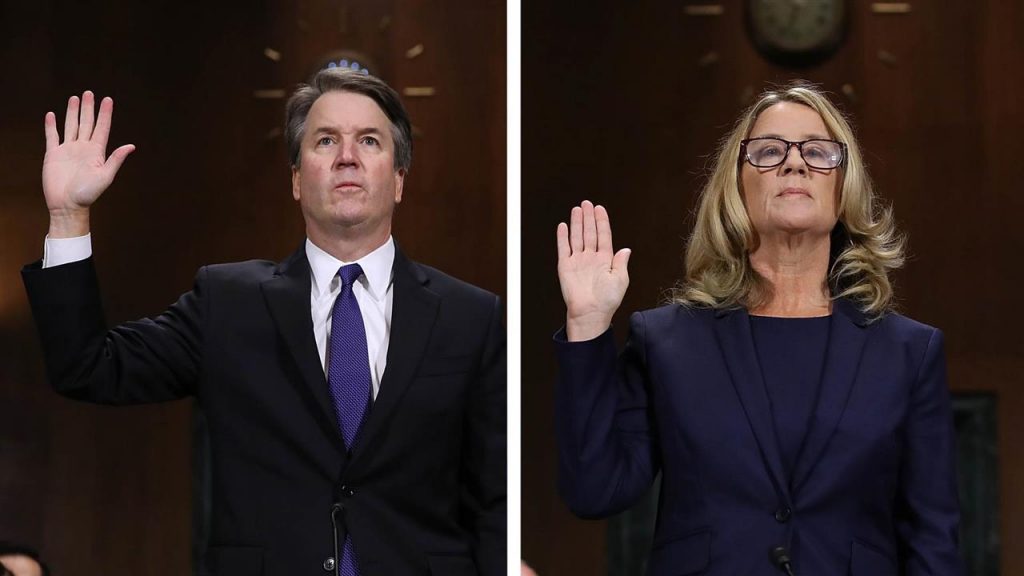Now what?
So what?
These questions pretty much sum up the reactions to the reality show playing out in Washington this week. Now there are three women who have come forward, publicly accusing him of sexually assaulting them back in the day? So what if the charges are true (what with their being a case of “youthful indiscretions” and all)? Now what will the Senate do, that the FBI has been tasked with gathering more information? So what if their investigation turns up damning evidence?
I don’t think these are the right questions to be asking in the first place. Once we get past all the details, from the bravery demonstrated by Dr. Blasey Ford in testifying despite feeling terrified to do so, to the display of unbridled white male anger from Judge Kavanaugh and certain Senators, with what are we left? How did we get here in the first place? How can we fix it? And what should the Church be saying and doing about it, if anything at all?
None of these questions has easy answers. What came through very clearly in the hearings on Thursday was the juxtaposition of the lifelong pain caused by sexual assault with that of a particular kind of privilege which has, for the entire history of this nation, assumed that it can simply take what it wants, without having to worry about suffering the consequences. What also came through clearly was the difficulty that those with privilege have in accepting responsibility for their actions, or those of their peers, when they are confronted by an actual human victim. It was an ugly display, in more ways than one. But once one peels away the ugliness, what’s left is fear: fear of not being taken seriously despite the enormous risk of speaking the words, “he assaulted me,” and fear of losing the spoils that place of privilege (perhaps falsely) promised.
It’s that primordial emotion to which God says repeatedly, “Do not be afraid!” The phrase appears most especially when God interacts with a human in an attempt to bring about a positive change. Starting with Abraham and ending with Mary Magdalene, this command becomes a way to get through to our lizard brains and open our eyes to the new possibility staring us right in the face. So perhaps instead of looking at the present political climate in terms of the worst-case scenario – and without diminishing the facts that the situation we are in is a) worthy of fear, and b) we could yet lose a great deal of what we claim to value if we do not collectively say we will not tolerate unchecked executive power, no matter who holds it – we should look at it as an opportunity. Think about it: this may well be the beginning of a positive cycle of change which will bring us closer to embodying the principle that all are created equal. Yes, we’ve come a long way in the last 60 years or so. It’s been costly for the nation as a whole, though perhaps particularly for those whom American society has traditionally afforded positions of privilege and power. However, we still have a long way to go. Those of us who occupy those places of privilege and power have to be willing to look the lepers, tax collectors, and prostitutes of our day in the eye and tell them that they also are beloved children of God – and then ACT on that truth. Until we can do that, we will continue to see the sort of weeping and gnashing of teeth which was on display in the Senate hearing room this past Thursday. Question is, are we willing to do what Jesus said it takes to get there?
To those who insist the Church shouldn’t get involved in the politics of the secular state, I say this: the Church is involved, whether we want it to be or not. Many of the religious voices which are speaking the loudest right now are on the part of the spectrum which wants desperately to prop up the status quo. A friend posted a meme to our community’s Facebook group yesterday to demonstrate how the Bible is already being used as a weapon to this end in the context of the Kavanaugh hearings. He wrote, “I’m sharing … to remind us all that we are better than this. It’s often necessary to preach the gospel of Christ as it applies to current events. We do this not to advocate for a certain political perspective; we do it because using the Bible like this is utterly inappropriate, irresponsible, and dangerous.”
What is appropriate, is preaching the Gospel. It is, by its nature, political. Jesus was not afraid to challenge the authorities when they failed to treat the poor with the dignity and respect required by the Law. He insisted on laying down his privilege on their behalf, while at the same time reminding anyone within earshot of the need to do the same. I wonder how different that Senate hearing might have looked if we had all taken a breath and done the same.
The Rev. Amy Spagna is an Episcopal priest, and a student in the Master of Sacred Theology program at Sewanee. She is a member of the editorial team for The Lead.
photo credit:Getty Images

